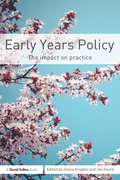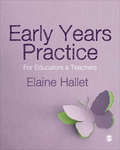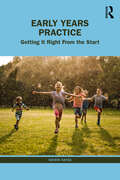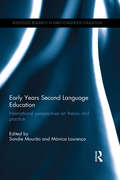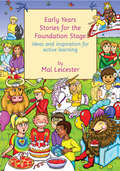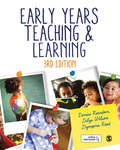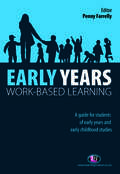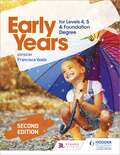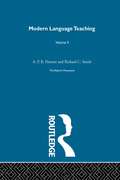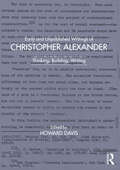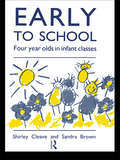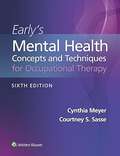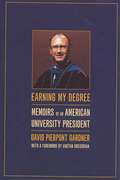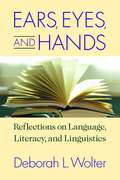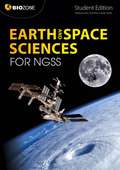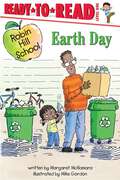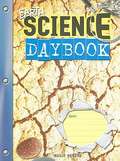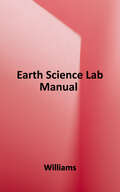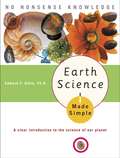- Table View
- List View
Early Years Policy: The impact on practice
by Zenna Kingdon Jan GourdHow does early years policy impact on practitioners, children, settings and families? What are the implications of current policy for the future? How can early years professionals shape and craft practice in ways that genuinely focus on the needs of children and families, rather than the interests of policy makers? This exciting new text explores the changing context and increasing importance of early years policy. It takes a broad look at policy developments and shows how these have affected children, settings, parents and the early years workforce. Divided into two parts, the first examines theoretical perspectives and sets out the early years policy context, looking at issues surrounding accountability, international influences on policy and the Early Years Foundation Stage. The second half of the book directly shows how policy has influenced practice, and considers: the upskilling of the workforce and the impact of this on practitioners; the development of the learning environment including outdoor provision; sustained shared thinking and its link to high quality learning and teaching; the impact of policy on parents. Offering a fresh perspective on early years policy, this timely textbook will be essential reading for students on undergraduate and postgraduate Early Years and Childhood Studies courses and those working towards Early Years Teacher status.
Early Years Practice: For Educators and Teachers (Issues In Practice Ser.)
by Dr Elaine Hallet'I would recommend this book to students and trainees who wish to extend their knowledge and understanding of early years practice beyond level 3. This book is accessible, up to date and focuses on translating theory into practice, incorporating the essential higher order skill of reflection. The pedagogical foundations within place children firmly at the centre, whilst acknowledging the highly influential early years practitioner in the wider context of family, community and inclusive practice.' Sarah Barton, Senior Lecturer and EY ITT Programme Leader, School of Education and Continuing Studies, University of Portsmouth Are you studying to become an early years teacher or educator, or studying for an early years degree, and looking for a book to guide you through your qualification? With stories of practice, questions for reflection, further reading and links to the Teachers' Standards (Early Years), this book links professional practice with theory and research and will help you: · understand how children learn and develop · engage with the curriculum and the practice of teaching · learn more about the structure and reality of early years provision and practice for children aged from 0-8 years · develop ways to reflect upon your practice · develop professional skills and attributes needed to take a leading role · understand how to apply all of this to practice. This core textbook is ideal for students of early years and early childhood courses and will support you in your practice in the early years.
Early Years Practice: For Educators and Teachers (Issues In Practice Ser.)
by Dr Elaine Hallet‘I would recommend this book to students and trainees who wish to extend their knowledge and understanding of early years practice beyond level 3. This book is accessible, up to date and focuses on translating theory into practice, incorporating the essential higher order skill of reflection. The pedagogical foundations within place children firmly at the centre, whilst acknowledging the highly influential early years practitioner in the wider context of family, community and inclusive practice.’ Sarah Barton, Senior Lecturer and EY ITT Programme Leader, School of Education and Continuing Studies, University of Portsmouth Are you studying to become an early years teacher or educator, or studying for an early years degree, and looking for a book to guide you through your qualification? With stories of practice, questions for reflection, further reading and links to the Teachers’ Standards (Early Years), this book links professional practice with theory and research and will help you: · understand how children learn and develop · engage with the curriculum and the practice of teaching · learn more about the structure and reality of early years provision and practice for children aged from 0–8 years · develop ways to reflect upon your practice · develop professional skills and attributes needed to take a leading role · understand how to apply all of this to practice. This core textbook is ideal for students of early years and early childhood courses and will support you in your practice in the early years.
Early Years Practice: Getting It Right From the Start
by Nóirín HayesThis fully revised edition of Early Years Practice: Getting It Right From the Start integrates theory and practice and expands on the topics of early childhood practice as located within the context of international curriculum frameworks including Aistear, the Irish framework. With two new chapters it introduces readers to the complexities and possibilities of a play-based pedagogy and the importance of pedagogical leadership. Drawing on recent international scholarship, the book pays particular attention to the role of outdoor play and learning and the impact of digital technologies. It considers how best to manage the competing demands, challenges and tensions that affect the daily experiences of educators and children in contemporary society. This new edition also revises the original text with expanded references on topics such as the ecology of early childhood settings, education for sustainability, developmental psychology, education and neuroscience. This timely text also reviews international literature from both research and practice, strengthens understandings of the key role of relationships to quality practice and the effects on the development and learning of young children. All the chapters provide specific examples of good practice with strategies and suggestions aimed at enhancing the overall experience of early childhood settings for both educators and children. The information collected and explored in the book can be used by lecturers and educators alike to stimulate conversation, guide reflection and support the profession of early childhood educators to collectively work towards achieving, supporting and sustaining high-quality early years practice that adds constructively to the lives of babies and young children.
Early Years Second Language Education: International perspectives on theory and practice (Routledge Research in Early Childhood Education)
by Mónica Lourenço Sandie MourãoThe age for early language learning has dropped dramatically in the past decade to include children under 6 years old, yet very little published research exists to support the implementation of such programmes. Drawing on a synthesis of theory, research and practice, this edited volume makes an innovative contribution to literature concerning language education for very young children. It explores language learning in a wide range of geographical contexts with reference to second and foreign language learning, bilingualism and plurilingualism with children under the age of 6 years old. Chapters present discussion around teacher education, policy-making, international case studies, school and home-based projects, code switching and language use, and methodologies and approaches. Early Years Second Language Education: International perspectives on theory and practice will be essential reading for researchers, academics, teacher trainers, and post-graduate students in the fields of early years education, foreign and second language education, language didactics and teacher education.
Early Years Stories for the Foundation Stage: Ideas and Inspiration for Active Learning
by Mal LeicesterFollowing on from the success of Mal Leicester's previous books Stories for Classroom and Assembly and Stories for Inclusive Schools, this book shows how to make use of the learning power of story-time for young children, providing original, themed stories and associated learning activities to promote young children's cognitive and emotional development. Stories in this highly practical resource stimulate the child's interest and acts as a springboard to related learning games designed to develop children's skills in the six foundation areas of learning: personal, social and emotional development communication, language and literacy mathematical development knowledge and understanding of the world physical development creative development. Beautifully illustrated throughout, with extensive photocopiable material, this book recognizes the importance of play, games, social interaction, parental involvement, multicultural education and how to enjoy learning from an early age. All Early Years practitioners will find this book an essential addition to their bookshelves.
Early Years Teaching and Learning
by Denise Reardon Dilys Wilson Dympna Fox ReedCovering all routes to early years teaching, this textbook provides students and practitioners with everything they need to know to achieve their Early Years qualification. Previously titled Achieving Early Years Professional Status, this fantastic new edition is completely revised to include guidance and advice for those studying: Early Years Teacher Status Teach First Early Years Early Years Educator Early Years PGCE With new case studies illustrating best practice this text is also essential for professionals working in Early Years Education, Children’s Centres and local authorities. Journal articles linked to each chapter are available at https://study.sagepub.com/education
Early Years Teaching and Learning
by Denise Reardon Dilys Wilson Dympna Fox ReedCovering all routes to early years teaching, this textbook provides students and practitioners with everything they need to know to achieve their Early Years qualification. Previously titled Achieving Early Years Professional Status, this fantastic new edition is completely revised to include guidance and advice for those studying: Early Years Teacher Status Teach First Early Years Early Years Educator Early Years PGCE With new case studies illustrating best practice this text is also essential for professionals working in Early Years Education, Children’s Centres and local authorities. Journal articles linked to each chapter are available at https://study.sagepub.com/education
Early Years Work-Based Learning (Working with Children, Young People and Families LM Series)
by Penny FarrellyThis book supports students on foundation degrees and degrees in Early Years and Early Childhood Studies that have a work-based element. An essential introduction to becoming a professional in the sector, it begins by looking at work-based learning and goes on to cover study, research skills and essential subject knowledge. It includes activities to help students increase their confidence and get the most out of their course. Essential information on Early Years Professional Status (EYPS) considers the current scene and the future of the sector.
Early Years for Levels 4, 5 and Foundation Degree Second Edition
by Francisca VealeEngage learners with this new and fully updated edition that covers core topics across all aspects of Early Years.This comprehensive full-colour textbook will build knowledge and understanding, from traditional theory to cutting-edge research, and from updated legislative and regulatory frameworks, to effective practice examples. - Benefit from the expert knowledge of authoritative contributors, skilfully edited by Dr Francisca Veale.- Content carefully matched to core modules offered on higher level early years programmes.- New and relevant material covering literacy, numeracy and digital literacy.Who is this book for?Early Years for Levels 4 & 5 and the Foundation Degree is an authoritative and accessible course textbook for anyone studying at Levels 4 and 5, whether a Foundation Degree, HNC/HND, the first year of an undergraduate programme or other higher vocational qualifications related to early years or early childhood studies. It is also relevant to those working towards Early Years Professional Status (EYPS) or Early Years Teacher Status (EYTS).
Early Years for Levels 4, 5 and Foundation Degree Second Edition
by Francisca VealeEngage learners with this new and fully updated edition that covers core topics across all aspects of Early Years.This comprehensive full-colour textbook will build knowledge and understanding, from traditional theory to cutting-edge research, and from updated legislative and regulatory frameworks, to effective practice examples. - Benefit from the expert knowledge of authoritative contributors, skilfully edited by Dr Francisca Veale.- Content carefully matched to core modules offered on higher level early years programmes.- New and relevant material covering literacy, numeracy and digital literacy.Who is this book for?Early Years for Levels 4 & 5 and the Foundation Degree is an authoritative and accessible course textbook for anyone studying at Levels 4 and 5, whether a Foundation Degree, HNC/HND, the first year of an undergraduate programme or other higher vocational qualifications related to early years or early childhood studies. It is also relevant to those working towards Early Years Professional Status (EYPS) or Early Years Teacher Status (EYTS).
Early Years of Reform (Logos Studies in Language and Linguistics)
by Richard C. Smith A. P. R. HowattThis volume forms part of a five volume set charting the progress of the nineteenth century movement, which was instrumental in establishing international guidelines for the teaching of modern languages. It was during this period that for the first time, co-operation between phoneticians and teachers culminated in the publication of works that were instrumental in establishing the 'applied linguistic' approach to language teaching in the twentieth century. For the first time, too, the new science of psychology influenced a scientific theory of second language acquisition. The Reform Movement attracted support across Europe, spurring the development of new professional associations and journals. In turn, the publication in these journals of reports of innovative practice contributed to a greater sense of autonomy and professionalism among modern language teachers, who had hitherto tended to live under the shadow of classical language teaching. The practical innovations and theoretical suggestions for the foreign language teaching, although rooted in the nineteenth century, still have relevance today.
Early and Unpublished Writings of Christopher Alexander: Thinking, Building, Writing
by Howard DavisThis book brings together key works of the noted architect and architectural theorist Christopher Alexander (1936–2022), many of which have not been published before. The book contains twenty-five essays and other works, many chosen from the newly organized Christopher Alexander archive, providing a window into the ideas and thought process of one of the most innovative architectural thinkers of the twentieth century. The items span Alexander’s fifty-year career, beginning with an early version of his PhD dissertation based on fieldwork in India, continuing to fifteen years in the development of A Pattern Language, one of the best-selling books in the history of architecture, and proceeding to the writing of The Nature of Order, Alexander’s four-volume masterwork, and beyond. The writings combine theory and descriptions of practice, and together support a blueprint for the development of a new, humane way of building, while also providing a window into the mind of an extraordinary thinker, teacher and professional.
Early to School: Four Year Olds In Infant Classes
by Sandra Brown Shirley CleaveThis very practical book offers advice for teachers. The authors pinpoint the particular educational needs of four year olds and give advice on meeting them together with positive examples of good practice. Areas covered include staffing, space, equipment and materials, teaching styles and monitoring progress. This is the essential aid to teaching four year olds.
Early’s Mental Health Concepts and Techniques for Occupational Therapy, Sixth Edition
by Cynthia Meyer Courtney S. SassePacked with up-to-date, evidence-based practice information and examples of contemporary interventions, Early’s Mental Health Concepts and Techniques for Occupational Therapy Practice, 6th Edition, equips occupational therapy/occupational therapy assistant students and practitioners with an authoritative guide to working effectively with clients with mental health issues across all practice settings. This practical, bestselling text delivers a holistic approach to client care, directly addressing the clinical needs of COTAs and OTs in assessing clients’ psychosocial status and providing interventions that improve their quality of life. <P><P> An ideal resource for OT students as well as those pursuing an Occupational Therapy Doctorate, the extensively updated 6th Edition expands coverage of the many assessments and interventions available in today’s clinical practice, empowering users with a sound foundation in occupational therapy processes and clearly demonstrating how to effectively intervene to meet the needs of clients with mental health issues. <P><P> NEW! Assessments and Interventions section boosts students’ clinical application capabilities for confident OT/OTA practice. <P><P> UPDATED! OT models aligned with the latest OT Practice Framework keep students current with the latest practices and approaches. <P><P> NEW! Full-color presentation increases student engagement and clarifies complex information.
Earning My Degree: Memoirs of an American University President
by David Pierpont GardnerDavid Pierpont Gardner. who was president of one of the world's most distinguished centers of higher learning, the University of California, from 1983 to 1992, provides an insider's account of what it was like for a very private, reflective man to live an extremely public life as leader of one of the most complex and controversial institutions in the country. A chronicle of how uncommon leadership and courage shaped a treasured and sometimes mystifying American institution.
Ears, Eyes, and Hands: Reflections on Language, Literacy, and Linguistics
by Deborah L. WolterEars, Eyes, and Hands presents the author’s reflections on language, literacy, and linguistics that have been shaped by her deafness and by her work as an educator. In short, engaging narratives, Deborah L. Wolter exposes deeply entrenched attitudes and stereotypes regarding language, bringing to bear her own experiences as a deaf person as well as her interactions with children from varying backgrounds. Wolter reveals and rectifies the impact of deficit mindsets in the educational system regarding race, ethnicity, economic status, gender, and disability. As a literacy specialist, she works with students who fall through the cracks in a system that strives to embrace the diverse backgrounds and abilities found in the classroom. Her passion for engaging students and cultivating literacy shines in the stories she tells, which serve as parables that allow readers to evaluate their own attitudes and assumptions. Educators, parents, and community members will benefit from Wolter’s examination of sociolinguistics and language privilege as she identifies how ethnocentrism and ableism are contributing to negative educational outcomes for some students. With humor and warmth, she offers a path toward approaching language and listening as a gateway to connection and understanding, both inside the classroom and beyond.
Earth Alert! (Girl Talk #14)
by L. E. BlairThe earth is in trouble, but we can save it! Kids at Bradley Junior High can make a difference. Kids all over the world can make a difference!" --says Allison Cloud, speaking at the Earth Alert Fair. When Allison is elected chairperson of the seventh-grade Earth Alert Fair, she's determined to get the kids at Bradley Junior High concerned about the earth. But things almost turn into a disaster when Stacy the Great decides that she wants to run the fair--her way! Stacy spends the money for the fair on a roller coaster and ferris wheel which are energy hogs. Will anyone want to come to the fair Allison and her friends have planned with Native American games and natural foods? And there's something else on Allison's mind. The new kid from California flirts with her and asks her on a date and Billy, the kid she really likes, isn't speaking to her. Find out what goes on in seventh grade. Look for the other Girl Talk books in the Bookshare collection.
Earth And Space Science For NGSS
by Tracey GreenwoodEarth and Space Sciences for NGSS has been specifically written to meet the requirements of the Next Generation Science Standards (NGSS) for High School Earth and Space Sciences (HS-ESS). It encompasses all three dimensions of the standards (science and engineering practices, crosscutting concepts, and disciplinary core ideas), addressing the program content through a wide range of engaging student-focused activities.
Earth Day: Ready-to-Read Level 1 (Robin Hill School)
by Margaret McNamaraIn the latest beginning reader from the bestselling, classroom based Robin Hill School series the class celebrates Earth Day! <p><p> The kids in Mrs. Connor's class are celebrating Earth Day, and everyone has lots of ideas on how to save the Earth...except Emma. Emma is worried that her ideas are not good enough. With the help of her dad and Mrs. Connor, Emma learns that her small ideas can have big results!
Earth Science Laboratory Manual
by Harry Williams Kent McGregor Ken Iles George Maxey Lisa Nagaoka Alexandra Ponette-GonzalezThis Earth Science Laboratory Manual is meant to supplement and reinforce lecture material by giving you an opportunity to apply what you learn in class through hands-on activities. <p><p>The exercises illustrate some of the fundamental principles of earth science using a mixture of hypothetical data sets, data from scientific publications and data collected locally from the North Texas region. The exercises emphasize a hands-on, quantitative approach, supplemented by a web-based virtual field trips and CD-ROM exercises.
Earth Science Made Simple: A Clear Introduction to the Science of Our Planet (Made Simple)
by Edward F. AlbinWe see it every day, yet we understand so little about Earth. From minerals to meteorites, this book covers every aspect of the science of our world. It breaks this complex discipline into four major sections: geology, oceanography, meteorology, and planetary science, and it gives an overview of the processes of each. Complete with interactive experiments and a glossary, this book makes the study of our planet--and other planets-- easier than ever.
Earth Science, Alabama, Grade 6
by Mcgraw-Hill EducationThis Alabama Edition of Earth Science for Grade 6 contains lessons on: Unit 1: Exploring Earth, Unit 2: Geologic Changes, Unit 3: Weather and Climate, Unit 4: Water and Other Resources, Unit 5: Exploring the Universe.
